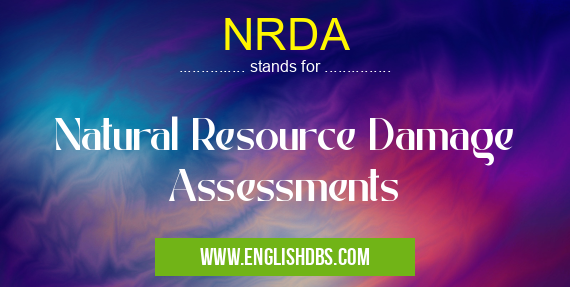What does NRDA mean in UNCLASSIFIED
NRDA stands for Natural Resource Damage Assessments. It is a process used to determine the extent of environmental damage caused by human activities and to assess the compensation required to restore or replace the natural resources that have been affected. NRDA is a legal framework that provides a systematic and comprehensive approach to assessing and restoring natural resource damages.

NRDA meaning in Unclassified in Miscellaneous
NRDA mostly used in an acronym Unclassified in Category Miscellaneous that means Natural Resource Damage Assessments
Shorthand: NRDA,
Full Form: Natural Resource Damage Assessments
For more information of "Natural Resource Damage Assessments", see the section below.
Key Elements of NRDA
-
Identification of Responsible Parties: NRDA involves identifying the parties responsible for causing the environmental damage. This can include individuals, corporations, or government agencies.
-
Quantification of Damages: NRDA involves quantifying the extent of the damage caused to natural resources. This includes assessing the loss or degradation of habitats, populations, and ecosystem services.
-
Restoration and Compensation: Based on the assessment of damages, NRDA determines the appropriate restoration and compensation measures to compensate for the environmental damage. This can include restoring habitats, repopulating affected species, or providing financial compensation.
-
Public Participation: NRDA encourages public participation in the assessment and restoration process. This allows stakeholders to provide input and ensure that the process is transparent and accountable.
Benefits of NRDA
-
Environmental Justice: NRDA provides a mechanism for holding polluters accountable for their actions and ensuring that natural resources are protected.
-
Restoration of Ecosystems: NRDA helps to restore and protect damaged ecosystems, ensuring their continued functioning and value for future generations.
-
Prevention of Future Damage: By assessing the causes of environmental damage, NRDA helps to prevent similar incidents from occurring in the future.
Essential Questions and Answers on Natural Resource Damage Assessments in "MISCELLANEOUS»UNFILED"
What is a Natural Resource Damage Assessment (NRDA)?
An NRDA is a process used to determine the extent and cost of damages to natural resources caused by an oil spill or other hazardous substance release. The goal of an NRDA is to restore or replace the injured resources and their services.
Who is responsible for conducting an NRDA?
NRDAs are typically conducted by federal, state, or tribal natural resource trustees. These trustees are responsible for managing and protecting the natural resources within their jurisdiction.
What are the steps involved in an NRDA?
The NRDA process typically involves the following steps:
- Preassessment: Gathering information and assessing the potential for injury to natural resources.
- Injury Determination: Determining whether natural resources have been injured and quantifying the extent of the injury.
- Restoration Planning: Developing a plan to restore or replace the injured resources and their services.
- Restoration Implementation: Implementing the restoration plan and monitoring the results.
What are the potential costs of an NRDA?
The costs of an NRDA can vary widely depending on the size and complexity of the spill or release. Costs can include:
- Assessment costs: Costs of conducting the NRDA process and gathering data.
- Restoration costs: Costs of implementing the restoration plan.
- Monitoring costs: Costs of monitoring the progress of restoration efforts.
How are the costs of an NRDA recovered?
The costs of an NRDA are typically recovered from the responsible party for the spill or release. This can be done through a settlement agreement or a court order.
Final Words: NRDA is an important tool for protecting and restoring natural resources that have been damaged by human activities. By providing a systematic and comprehensive framework for assessing and compensating for environmental damages, NRDA ensures that polluters are held accountable and that natural resources are protected for future generations.
